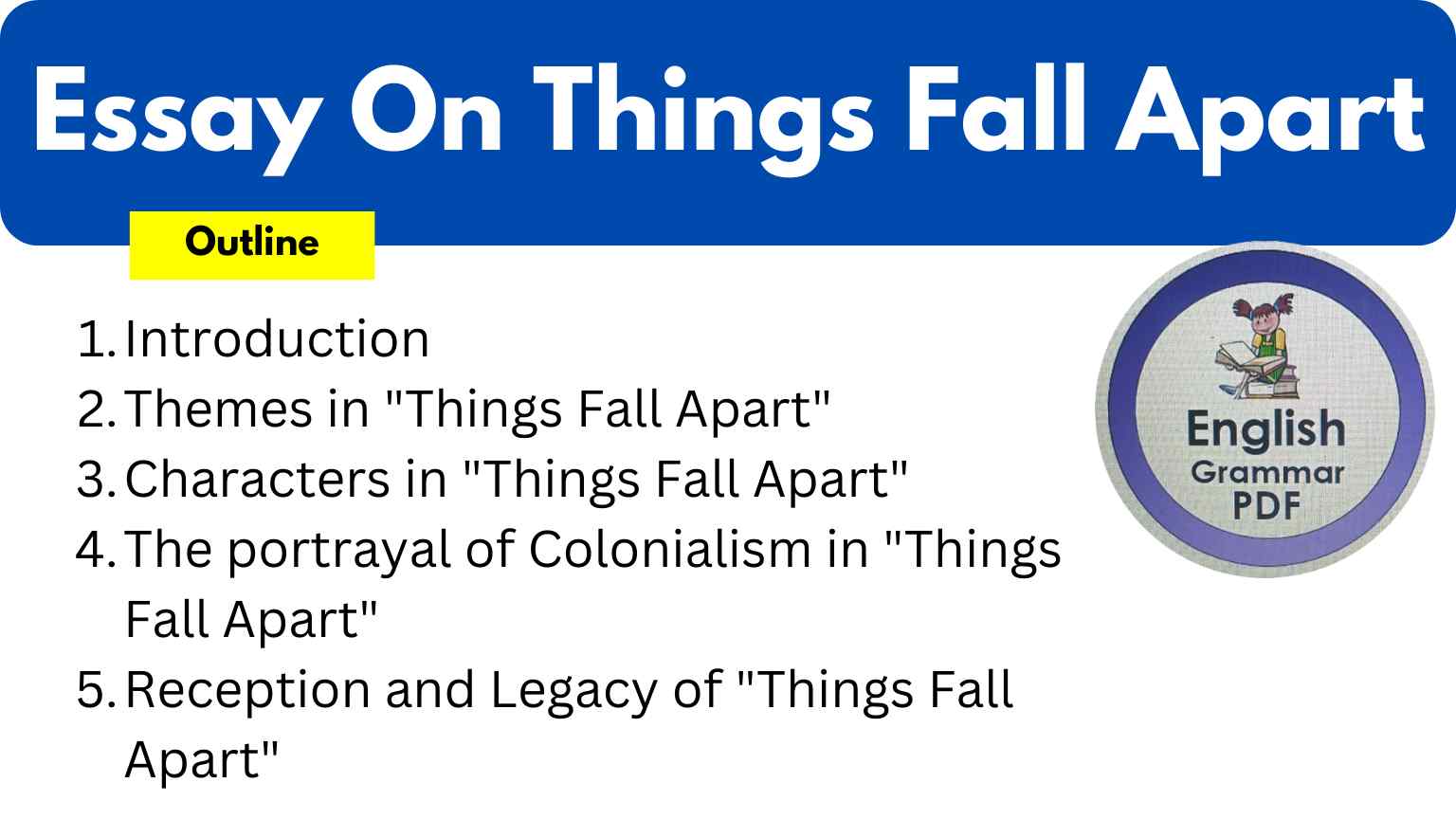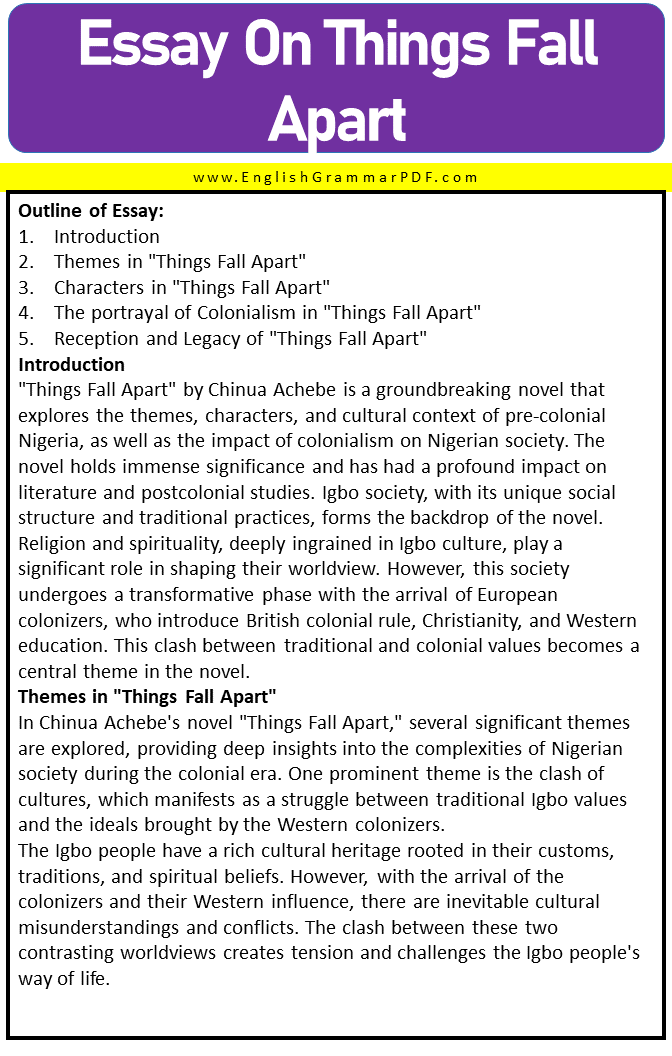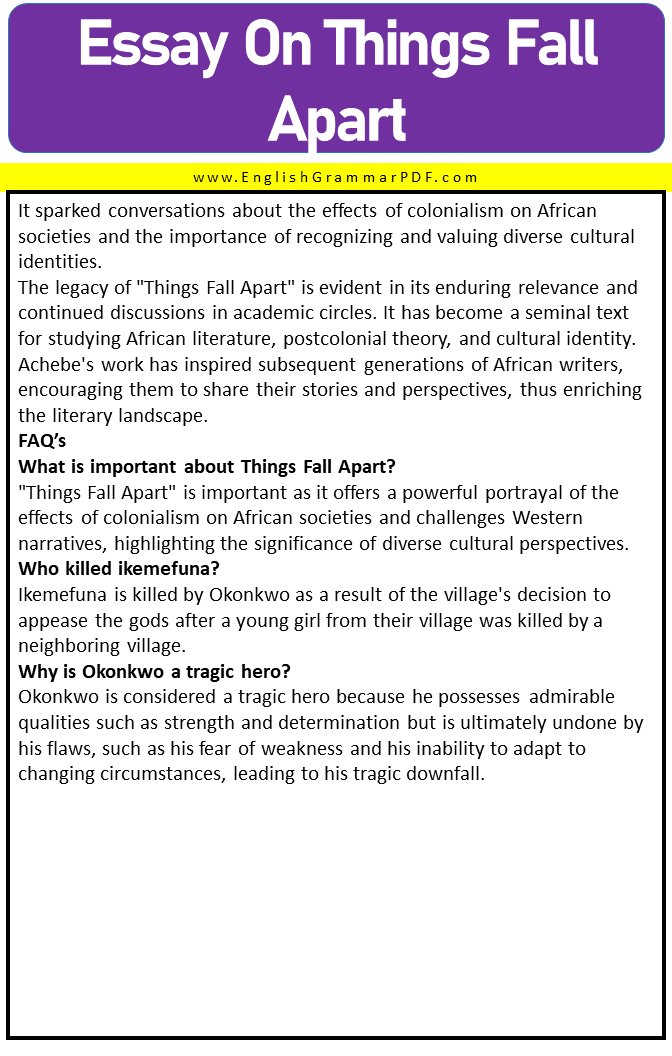Essay On Things Fall Apart
Outline of Essay:
- Introduction
- Themes in “Things Fall Apart”
- Characters in “Things Fall Apart”
- The portrayal of Colonialism in “Things Fall Apart”
- Reception and Legacy of “Things Fall Apart”
Introduction
“Things Fall Apart” by Chinua Achebe is a groundbreaking novel that explores the themes, characters, and cultural context of pre-colonial Nigeria, as well as the impact of colonialism on Nigerian society. The novel holds immense significance and has had a profound impact on literature and postcolonial studies. Igbo society, with its unique social structure and traditional practices, forms the backdrop of the novel. Religion and spirituality, deeply ingrained in Igbo culture, play a significant role in shaping their worldview. However, this society undergoes a transformative phase with the arrival of European colonizers, who introduce British colonial rule, Christianity, and Western education. This clash between traditional and colonial values becomes a central theme in the novel.
Themes in “Things Fall Apart”
In Chinua Achebe’s novel “Things Fall Apart,” several significant themes are explored, providing deep insights into the complexities of Nigerian society during the colonial era. One prominent theme is the clash of cultures, which manifests as a struggle between traditional Igbo values and the ideals brought by the Western colonizers.
The Igbo people have a rich cultural heritage rooted in their customs, traditions, and spiritual beliefs. However, with the arrival of the colonizers and their Western influence, there are inevitable cultural misunderstandings and conflicts. The clash between these two contrasting worldviews creates tension and challenges the Igbo people’s way of life.
Gender roles and power dynamics are also explored in the novel. In Igbo society, there are distinct roles and expectations for men and women. Men hold positions of authority and power, while women are primarily responsible for domestic affairs and child-rearing. However, with the advent of colonialism, there is a shift in gender dynamics.
The influence of Western ideals introduces new notions of gender equality and challenges the traditional roles and power structures within the Igbo community. This disruption of gender norms and the struggle to adapt to the changing societal dynamics form a significant aspect of the novel’s thematic exploration.
Another essential theme is that of identity and change. The protagonist, Okonkwo, grapples with his identity throughout the narrative. He strives to embody the traditional masculine ideals of his society but also faces internal conflicts and contradictions.
Okonkwo’s struggle with his identity reflects the larger struggle of the Igbo community as they navigate the transformative period of colonial rule. The arrival of the colonizers brings significant changes to Igbo society, leading to a transformation in their social, cultural, and political fabric. The impact of these changes on individual and collective identities is explored, highlighting the challenges and complexities of navigating a rapidly changing world.
Characters in “Things Fall Apart”
“Things Fall Apart” by Chinua Achebe presents a diverse and compelling cast of characters that contribute to the richness and depth of the novel. These characters reflect the complexities of Nigerian society during the colonial era and provide different perspectives on the themes explored.
The central character, Okonkwo, is a complex and tragic figure who embodies the values and traditions of his society. He is characterized by his strength, ambition, and determination to be the antithesis of his weak father. Okonkwo’s internal struggles and conflicts with the changing world around him make him a compelling and relatable character.
Nwoye, Okonkwo’s son, undergoes a significant transformation throughout the novel. Initially, he tries to live up to his father’s expectations but eventually questions the rigid gender roles and the violent aspects of their culture. Nwoye’s conversion to Christianity catalyzes his personal growth and his rejection of his father’s ideals.
Mr. Brown and Reverend James Smith, the colonial missionaries, represent the clash between traditional Igbo values and the introduction of Christianity. Mr. Brown adopts a more tolerant and understanding approach, seeking to coexist and understand the Igbo culture. In contrast, Reverend James Smith takes a more rigid and uncompromising stance, leading to increased tensions and conflicts.
The portrayal of Colonialism in “Things Fall Apart”
The novel portrays the profound impact of colonialism on Igbo society. It highlights the erosion of traditional customs and practices as the colonizers introduce their values and systems. The loss of social and political autonomy is another consequence of colonial rule, with the Igbo people finding their way of life disrupted and undermined. However, the novel also portrays resistance and rebellion, with Okonkwo and the Igbo community challenging the dominance of the colonizers, showcasing the resilience of Nigerian society.
Reception and Legacy of “Things Fall Apart”
The reception and legacy of “Things Fall Apart” have been profound, making it one of the most celebrated and influential works in African literature. Since its publication in 1958, the novel has received widespread critical acclaim and has been translated into numerous languages, reaching readers around the world. Achebe’s skillful storytelling, nuanced portrayal of characters, and exploration of complex themes have garnered praise from literary critics and scholars alike.
The novel’s impact extends beyond the realm of literature. “Things Fall Apart” played a pivotal role in shaping the discourse on postcolonial studies, challenging Western narratives and providing a voice to previously marginalized perspectives. It sparked conversations about the effects of colonialism on African societies and the importance of recognizing and valuing diverse cultural identities.
The legacy of “Things Fall Apart” is evident in its enduring relevance and continued discussions in academic circles. It has become a seminal text for studying African literature, postcolonial theory, and cultural identity. Achebe’s work has inspired subsequent generations of African writers, encouraging them to share their stories and perspectives, thus enriching the literary landscape.
FAQ’s
What is important about Things Fall Apart?
“Things Fall Apart” is important as it offers a powerful portrayal of the effects of colonialism on African societies and challenges Western narratives, highlighting the significance of diverse cultural perspectives.
Who killed ikemefuna?
Ikemefuna is killed by Okonkwo as a result of the village’s decision to appease the gods after a young girl from their village was killed by a neighboring village.
Why is Okonkwo a tragic hero?
Okonkwo is considered a tragic hero because he possesses admirable qualities such as strength and determination but is ultimately undone by his flaws, such as his fear of weakness and his inability to adapt to changing circumstances, leading to his tragic downfall.
Download the PDF of the Essay:
Explore More Essays:







